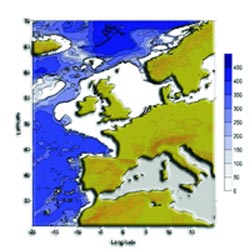Cold Storage Solution For Global Warming?

<br>Thickness of the carbon dioxide hydrate stability zone offshore Western Europe (meters), expressed in blue contoured areas, showing large regions with suitable conditions for storage as a liquid and hydrate. The grey zone is outside the study area.
Their research, published in the journal, Planet Earth, reveals that CO2 can be contained in cool geological aquifers or reservoirs, where it can remain harmlessly for many thousands of years.
PhD research student, Ameena Camps, is working with Professor Mike Lovell at the University’s Department of Geology and with Chris Rochelle at BGS, investigating the storage of CO2.
Storing the gas in a solid form as a gas hydrate, or as a pool of liquid CO2 below a cap of hydrate cemented sediments, is believed to offer an alternative method of geological sequestration to the current practices of storage in warm, deep sediments in the North Sea.
Recently quoted in Planet Earth Ameena Camps explained: “Hydrates (also known as clathrates) are ice-like crystalline minerals that look like normal ice and form when gas and water freeze together at low temperature and high pressure. They are made of a cage of frozen water molecules with the gas molecules trapped inside.”
Although gas hydrates were first discovered two centuries ago, the possible use of carbon dioxide hydrate as a means to help resolve problems of global climate change, and of naturally occurring methane hydrate as a future source of energy, have only recently been suggested.
Laboratory experiments carried out as part of Ameena Camps’ PhD project have indicated that carbon dioxide hydrate should form stable structures in sediments under oceans. By employing geophysical techniques and computer modelling, Ms Camps has identified a number of sites in Western Europe with the potential to store carbon dioxide by this method.
She is also exploring further implications of her research that may benefit geologists’ understanding of the stability of deep submarine slopes and contribute to improvements in global water supplies through further understanding of desalination processes.
Professor Mike Lovell, of the University of Leicester Department of Geology commented: “Ms Camps’ work is at the forefront of gas hydrate research, and has produced some very exciting results, highlighting the importance of investment in further studies of hydrates.
“Investigations of natural methane hydrates will help our understanding of their role as a natural hazard, while carbon dioxide hydrates are a potential sink for greenhouse gas emissions. This work also has application in other fields such as space research into hydrates on other planetary bodies.”
Media Contact
All latest news from the category: Earth Sciences
Earth Sciences (also referred to as Geosciences), which deals with basic issues surrounding our planet, plays a vital role in the area of energy and raw materials supply.
Earth Sciences comprises subjects such as geology, geography, geological informatics, paleontology, mineralogy, petrography, crystallography, geophysics, geodesy, glaciology, cartography, photogrammetry, meteorology and seismology, early-warning systems, earthquake research and polar research.
Newest articles

Trotting robots reveal emergence of animal gait transitions
A four-legged robot trained with machine learning by EPFL researchers has learned to avoid falls by spontaneously switching between walking, trotting, and pronking – a milestone for roboticists as well…

Innovation promises to prevent power pole-top fires
Engineers in Australia have found a new way to make power-pole insulators resistant to fire and electrical sparking, promising to prevent dangerous pole-top fires and reduce blackouts. Pole-top fires pose…

Possible alternative to antibiotics produced by bacteria
Antibacterial substance from staphylococci discovered with new mechanism of action against natural competitors. Many bacteria produce substances to gain an advantage over competitors in their highly competitive natural environment. Researchers…





















